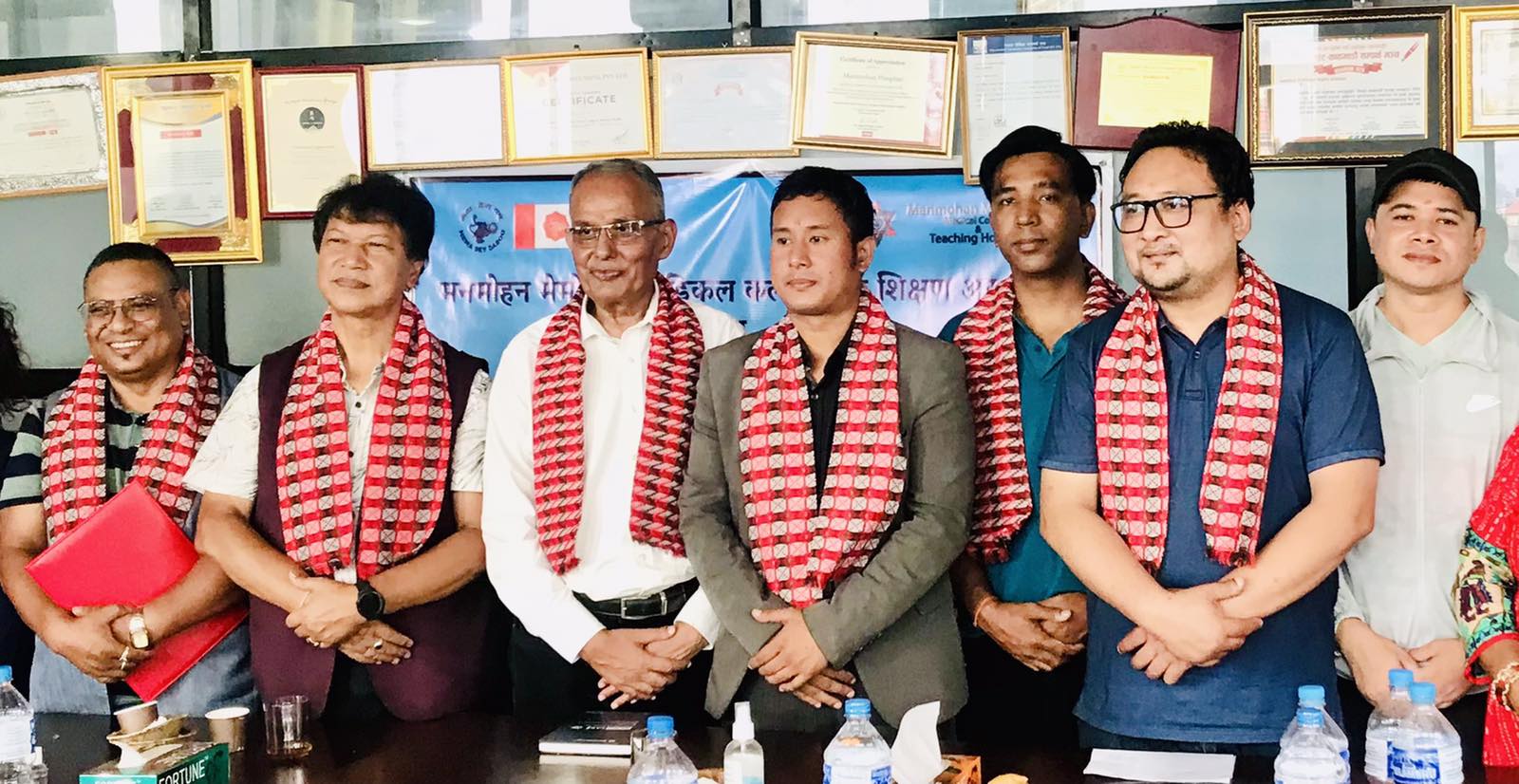Japan provides mammography machine to Nepal Cancer Care Foundation
Japan has provided mammography equipment to Nepal Cancer Care Foundation, a specialized medical organization focused largely on women’s cancer screening.
A handover ceremony was held at the foundation’s office in Satdobato, Lalitpur, on Monday. On the occasion Ambassador of Japan Kikuta Yutaka praised the foundation for its works in the field of cancer treatment.
“The Embassy of Japan hopes that this initiative will further contribute to strengthening medical services and foster deeper friendship and cooperation between the people of Japan and Nepal,” he said.
The mammography equipment was provided under Japan’s Grant Assistance for Grassroots Human Security Projects (GPP). Since the start of GGP in 1991, it has successfully completed over 200 projects in Nepal.

Ambassador Yutaka expressed optimism that the sophisticated mammography technology would result in early detection, thereby enhancing the health and quality of life for people, families, and communities throughout Nepal.
“Nepal Cancer Care Foundation has already conducted breast cancer screening for more than 500 women using the equipment provided by GGP, showcasing the immediate impact of the project on enhancing medical services,” said Yutaka.
The foundation was established in 2011 with the goal of reducing the cancer burden through screening and counseling services, particularly for breast and cervical cancers. Its services are provided at their diagnostic center in Lalitpur, as well as through screening health camps in rural areas across the country.
 “We are sincerely thankful to everyone who has contributed to the success and growth of this foundation. We extend our heartfelt gratitude to the Japanese Embassy for their generous donation of a mammography machine, a significant contribution that will undoubtedly improve the lives of thousands of Nepali women, enabling them to lead healthier and better lives,” general secretary of the foundation Dr Sarita Ghimire.
“We are sincerely thankful to everyone who has contributed to the success and growth of this foundation. We extend our heartfelt gratitude to the Japanese Embassy for their generous donation of a mammography machine, a significant contribution that will undoubtedly improve the lives of thousands of Nepali women, enabling them to lead healthier and better lives,” general secretary of the foundation Dr Sarita Ghimire.
Nominations for Isa Award till Jan 2024
The Board of Trustees of the Isa Award for Service to Humanity, chaired by Shaikh Mohammed bin Mubarak Al Khalifa, the special representative of King Hamad bin Isa Al Khalifa, stated that the Isa Award for Service to Humanity reflects the King’s unwavering commitment to supporting humanitarian work. They emphasized that the award was established as a tribute to the late Amir of Bahrain, Shaikh Isa bin Salman Al Khalifa, who devoted his life to serving humanity.
This announcement took place during the opening of nominations for the sixth edition (2023/24) of the Isa Award for Service to Humanity. The award was initially launched by the King in 2009 and aims to honor outstanding individuals and organizations that provide exceptional services to humanity.
In the fifth edition, the award was presented to the esteemed Nepali ophthalmologist, Dr Sanduk Ruit, in recognition of his remarkable contributions to human service through eye treatment.
Ali Abdullah Khalifa, the Secretary General of the Isa Award, highlighted that the Kingdom of Bahrain, through the establishment of this Award, has become a leading supporter of pioneering global initiatives that serve humanity. He further pointed out that the award stands as the first Arab award to globally recognize initiatives dedicated to serving humanity, gaining international recognition and acclaim.
“A jury of experts from around the world will judge the nominees’ work. The winner of the award will be presented with a Royal Certificate of Appreciation, a medal made of pure gold, and $1m at a ceremony in the Kingdom of Bahrain in June 2025,” the Secretary General said.
Nominations will close at the end of Jan 2024.
SAARC, WHH put efforts on nutrition-sensitive agriculture
South Asian nations are facing challenges in achieving Sustainable Development Goals (SDGs) related to ending hunger, improving nutrition, and promoting sustainable agriculture. Malnutrition is described as the greatest form of violence and a weapon of mass destruction. Shakeb Nabi, Country Director of Nepal of Welt Hunger Hilfe (WHH) says, “Two millions people die around a year globally of hunger i.e. 5,500 people per day die of hunger.”
The regional consultation meeting on “Promoting Nutrition sensitive Agriculture for improving Nutrition security and Health of Smallholders in South Asia” was held for a two-day period on 12-13 July 2023 in Kathmandu, with the goal of addressing malnutrition and food security as well as identifying major Nutritional Sensitive Approaches (NSA) in South Asia.
The event, organized by the South Asian Association for Regional Cooperation (SAARC) and Welt Hunger Hilfe (WHH), brought together stakeholders from the food and agriculture industries, government representatives, and experts in the field to discuss nutrition-sensitive approaches in the region.
Dr Tamanna Ferdous, the Regional Nutritional Advisor, emphasized the need for a multi-sectoral approach to combat child malnutrition in South Asia. She provided alarming statistics on global hunger and malnutrition, highlighting the insufficient consumption of necessary food groups by children in South Asia. “According to the Global Hunger Index research, world hunger is increasing and most children in South Asia do not consume enough of the necessary food groups,” she said that over 7m individuals experience regular hunger, and 2 out of 3 women who are of reproductive age have at least a micronutrient deficiency worldwide. Globally, 50m children are wasted, 150m children are stunted, and 30 percent of women of childbearing age have an iron deficiency.
Bedu Ram Bhusal, Minister of Agriculture and Livestock Development, attended the event as a special guest. Stephan Russek, Head of Development Corporation and Economics at the German Embassy, emphasized the importance of collaborative efforts and a multi-sector approach.
Minister Bhusal said that we should focus on indigenous crops to minimize hunger and malnutrition issues.
During the event, country representatives presented papers on the nutrition situation in their respective nations. Issues such as poor meal diversity, lack of micronutrients, improper cooking techniques, and increased marketing of unhealthy food were discussed. Progress reports showed improvements in reducing underweight, child wasting, and anemia in Nepal. However, challenges such as poor policy implementation, lack of coordination among stakeholders, unregulated pesticide use, and pre- and post-harvest losses still hinder Nepal’s nutrition-sensitive approaches.
Sujan Dhungel, senior monitoring and evaluation officer, presented a progress report on the state of anemia, stunting, and wasting. Within a five-year period, the prevalence of underweight decreased from 48 to 19 percent, child wasting decreased from 11.3 to eight percent, while anemia among children under the age of five decreased from 53 to 43 percent.
Sachin Jain, Secretary Bikash Samiti of Madhya Pradesh in India, highlighted the significance of nutrition-sensitive micro planning and community engagement. He emphasized the importance of equal participation, prioritization, implementation, and continuity in the community. Project Coordinator of WHH Nepal, Deependra Chaudhary, shared insights on a behavioral change approach to address malnutrition, specifically discussing a successful 15-day nutrition camp that educated the community on health and nutrition.
In a panel discussion, Sabnam Shiwakoti, Joint Secretary of Nepal’s Ministry of Agriculture and Livestock Development, identified weak strategic implementation, sectoral funding distribution, and inadequate reporting and monitoring as obstacles to improving nutritional security programs. Dr Dipika Agrahar, Principal Scientist at the Indian Council of Agricultural Research (ICAR), highlighted the lack of value placed on micronutrients in South Asia due to financial constraints.
The conference celebrated the collaborative multi-sectoral strategy called ‘Nutrition Smart Community,’ involving various stakeholders. It also resulted in new policies and recommendations to promote nutrition security in South Asian countries, taking into account the contextualized nutritional status of each country and the challenges discussed during the event
Regional consultation meeting on “Promoting nutrition sensitive agriculture for improving nutrition security and health of smallholders in South Asia”
The South Asian Association for Regional Cooperation (SAARC) along with Welthungerhilfe (WHH) is pleased to announce the hosting of a Regional Consultation Meeting focused on “Promoting Nutrition Sensitive Agriculture for Improving Nutrition Security and Health of Smallholders in South Asia.” This significant event will convene key stakeholders to collectively address the pressing issues of nutrition and health in the region, with a specific emphasis on smallholder farmers. Covering approximately 24 percent of the global population within just three percent of the world’s landmass, the South Asian region faces the highest population density worldwide. With around 67 percent of the population residing in rural areas and depending on agriculture, fisheries, and forest products for their livelihoods, the region continues to confront the challenge of undernutrition. While progress has been made in recent years, the prevalence of undernourishment remains significant, impacting an estimated 267m individuals. According to the Global Hunger Index, South Asia has the world’s highest hunger level, including the highest child stunting rate, and by far the highest child wasting rate of any world region. Recognizing the critical importance of achieving the Sustainable Development Goals (SDGs), with a particular focus on SDG II aimed at ending hunger, the SAARC Agriculture Vision 2020 underscores the need for food and nutrition security in the region. In response to this imperative, the upcoming regional consultation meeting will adopt a targeted approach, establishing a connection between agriculture, nutrition, and health. By promoting nutrition-sensitive agriculture, stakeholders aim to improve the nutrition and health outcomes of smallholder farmers, as well as consumers. The Nutrition Smart Community, demonstrated by Welthungerhilfe (WHH) aims to address malnutrition, with a particular focus on children under five years of age and women of reproductive age, by employing a comprehensive approach that involves multiple sectors and stakeholders. This approach encompasses integrated farming systems, which connect agriculture and natural resource management to ensure nutrition security. Additionally, the initiative focuses on institution building, nutrition education, nutrition-sensitive village micro-planning and access to government’s food and nutrition programs. Implemented across roughly 260 villages in vulnerable regions of Bangladesh, India, and Nepal, the Nutrition Smart Community project operates under the larger initiative called the “Regional Program for Promoting a Multisectoral Approach for Nutrition Smart Villages in Bangladesh, Nepal, and India.” The meeting is expected to yield several outputs, including an analysis of nutritional status at the country level, identification of key measures relevant to nutrition-sensitive agriculture, exploration of opportunities for promoting and expanding nutrition-sensitive agriculture in the region, and the publication of a comprehensive book capturing the findings and recommendations. About 30-35 participants, including high-profile dignitaries, representatives from SAARC member countries, Government officials from Bangladesh, India, and Nepal along with personnel from Welthungerhilfe (WHH) and its collaborative partners will take part in the workshop. During the workshop, seven SAARC countries will present their country’s situation focusing on the specific thematic areas along with learning and experiences from WHH Nutrition Smart Communities in Bangladesh, India and Nepal. Moreover, there will be informative keynote presentations focusing on the transformation of food systems and nutrition, as well as an overview of the status of child nutrition in South Asia during the ongoing global crisis. Welthungerhilfe, a prominent development partner, has joined hands with SAARC to support and contribute to the Regional Consultation Meeting. This partnership exemplifies the importance of collaboration among various stakeholders, including governments, private sectors, international communities, cooperatives, farmers and civil societies, to tackle the issue of nutrition and health in the region.



















